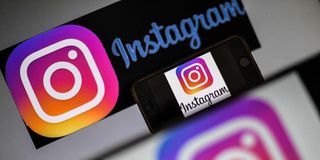How Instagram is robbing the youth of their happiness

In this file photo logos of US social network Instagram are displayed on the screen of a smartphone, on May 2, 2019 in Nantes, western France.
What you need to know:
- Every time I logged in, there were friends and acquaintances showing off their lavish lifestyles.
- Seeing friends appearing to be always on holiday or enjoying nights can make young people feel like they are missing out.
I first joined Instagram in December 2017 following pressure from friends and my cousins. Little did I know how much the photo and video-sharing social networking service owned by Facebook was going to drain me emotionally.
Every time I logged in, there were friends and acquaintances showing off their lavish lifestyles. Feed after feed showed photos and videos of them doing ‘incredible’ things and having a ‘wonderful’ time.
As if that was not enough, there was the pressure to gain followers on the platform. I started to feel miserable as many questions popped in my mind: “What is it that I am not doing that makes me unable to live like my friends? Does it mean I am not doing enough because I only have 50 followers?”
I was on Instagram from December 2017 to April 2018 where I managed to have only 93 followers. The photo that I had ranked highest only had 20 likes. I started to believe that there was something wrong with me. At some point, I started Googling stuff like “how to gain more followers on Instagram”.
Seeing friends appearing to be always on holiday or enjoying nights can make young people feel like they are missing out.
Stress
There is a term called Fear of Missing Out (FOMO), which is described as a social anxiety that stems from the belief that others might be having fun in your absence. It is characterised by a desire to stay connected with what others are doing, hence the endless, time consuming scrolling. FOMO is said to be a real and an increasingly common phenomenon that can cause significant stress.
Such feelings, if not managed, lead to comparison behaviour that causes one to set unrealistic goals. It is said that we have become enslaved in a fallacy that being popular on social media means you are loved and influential.
According to a status of mind survey of 1,475 young people aged between 14 and 24 years by the Royal Society for Public Health, Instagram is the worst social media network for mental health and well-being as it is associated with high levels of anxiety, depression, bullying and FOMO. Users must make a decision to protect themselves.
You can start by developing a disciplined attitude and coming up with self-regulatory strategies such as limiting the use of Instagram to once a week for a specific time, say, 15 minutes.
William King, 18, is a first year Journalism student at Multimedia University of Kenya. Are you aged 10-20 and would like to be Nation’s young reporter? Email your 400-600-word article to [email protected]




